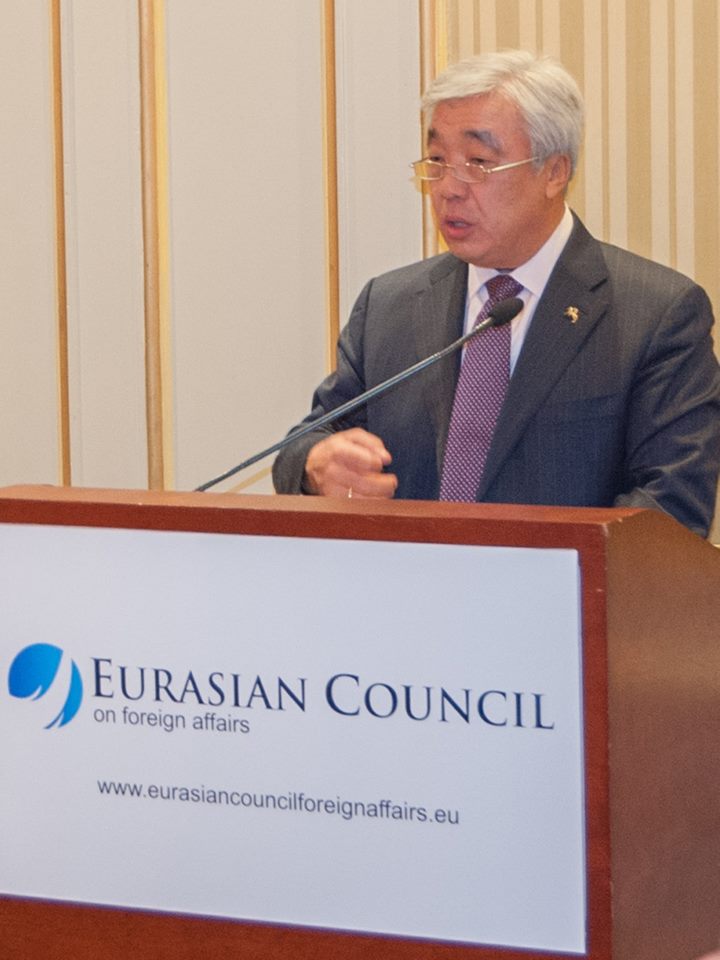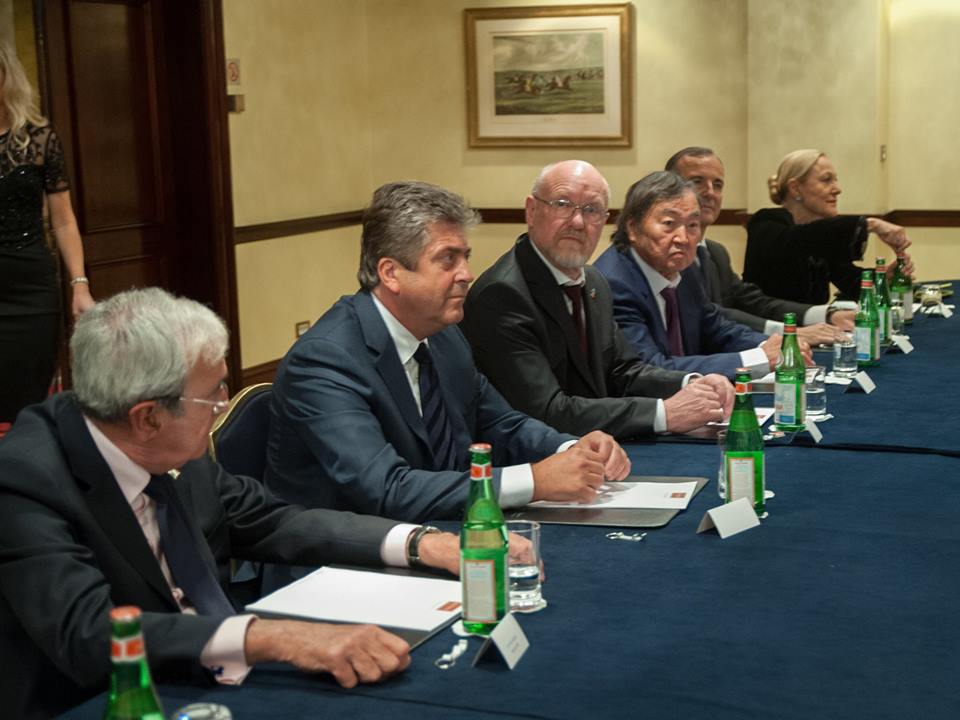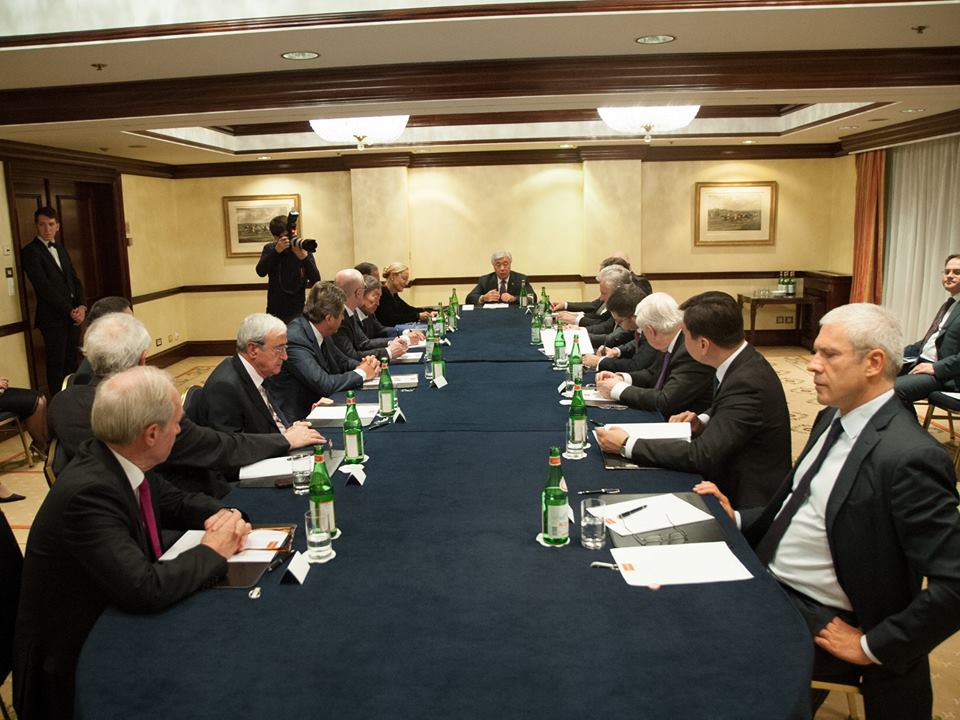BRUSSELS – Kazakh Minister of Foreign Affairs Erlan Idrissov visited Brussels on Nov. 12 to address a distinguished audience of European politicians and scholars at the launch of a new think tank dedicated to fostering the region’s relationship with the European Union.
 The new dialogue platform is called the Eurasian Council on Foreign Affairs (ECFA) and is headquartered in Brussels, according to its press release. It was founded to facilitate the exchange of knowledge and best practices, as well as strengthen the links between Central Asia and the European Union.
The new dialogue platform is called the Eurasian Council on Foreign Affairs (ECFA) and is headquartered in Brussels, according to its press release. It was founded to facilitate the exchange of knowledge and best practices, as well as strengthen the links between Central Asia and the European Union.
Prominent European statesmen, academics, EU, NATO and Organisation for Security and Cooperation in Europe (OSCE) officials and respected voices from around Europe attended the launch.
Benita Ferrero-Waldner, the former EU Commissioner for External Affairs and Foreign Minister of Austria Dr. was named the chairman of the ECFA Advisory Council. Idrissov was named the first honourary president of the new organization, which the country’s foreign ministry has supported with a grant. Rauan Kenzhekhanuly, the head of Kazakhstan’s Wiki Bilim public foundation and a graduate of the Bolashak programme, is the ECFA’s first founding director.
Other notable guests present at the ECFA launch ceremony included Lamberto Zannier, Secretary-General of the OSCE, Patrick Child, managing director of the European External Action Service, and Iveta Grigule, Chair of the Delegation to the EU-Kazakhstan, EU-Kyrgyzstan and EU-Uzbekistan Parliamentary Cooperation Committees, and for relations with Tajikistan, Turkmenistan and Mongolia as well as and the ambassadors of Kazakhstan, Kyrgyzstan, Tajikistan and Uzbekistan in Brussels.
In his opening remarks, Idrissov said the ECFA is not only historic, but also timely, because it is not always easy to bridge the cultural and psychological gaps between Europe and Asia.
“I believe the geographic, cultural and psychological gap between Europe and Asia will be increasingly bridged and blurred and everything will come together here in Brussels, in Europe and in the Eurasian Council on Foreign Affairs,” Kazakhstan’s Foreign Minister said.
Idrissov further talked about how for Kazakhstan, 2014 has been a memorable year. “2014 has seen the conclusion of important negotiations with the European Union on a new enhanced partnership and cooperation agreement (PCA) and on our imminent accession to the World Trade Organisation,” he stressed.
The completion of talks over PCA agreement, which is expected to be formally signed next year, was announced following a meeting between Kazakhstan’s President Nursultan Nazarbayev and the President of the EU Commission José Manuel Barroso in Brussels last month. The PCA agreement will enhance cooperation in 29 fields, including the economy, trade and investment, rule of law, democracy and nation building.
In his speech, Idrissov underscored the nation’s new economic strategy, the Nurly Zhol (Bright Road) announced by President Nazarbayev during a snap state-of-the-nation address on Nov. 11 in Astana. It serves as a clear vision for efficient and sustainable development in Kazakhstan, he said.
“In this period of global economic instability, the strategy will allow the country to not only weather this difficult stage, but also strengthen its already strong trajectory of sustained growth to achieve the objectives of [the Kazakhstan 2050 Strategy],” he said.
 Former Italian Foreign Minister Franco Frattini, another member of the ECFA advisory council, said Kazakhstan plays a very important role in Central Asia, as well as in promoting inter-cultural and inter-civilisational dialogue, and nuclear non-proliferation and therefore, it is essential that the European Union cooperate with the country in the most effective manner possible. “President Nazarbayev is making vital contributions to ensuring stability and sustainable development not only in Kazakhstan, but across the region. Therefore, the development of transportation in Kazakhstan is and will be important not only from an economic perspective, but regarding the development of people-to-people contacts.”
Former Italian Foreign Minister Franco Frattini, another member of the ECFA advisory council, said Kazakhstan plays a very important role in Central Asia, as well as in promoting inter-cultural and inter-civilisational dialogue, and nuclear non-proliferation and therefore, it is essential that the European Union cooperate with the country in the most effective manner possible. “President Nazarbayev is making vital contributions to ensuring stability and sustainable development not only in Kazakhstan, but across the region. Therefore, the development of transportation in Kazakhstan is and will be important not only from an economic perspective, but regarding the development of people-to-people contacts.”
According to Ferrero-Waldner, the conclusion of negotiations between Kazakhstan and the EU on a new enhanced PCA is “very important for moving relations to a qualitatively new level. Kazakhstan has made impressive progress since independence and is now moving towards new levels of growth.”
Aleksander Kwasniewski, the former President of Poland and also a member of ECFA advisory council, believes that Kazakhstan is now known to many across the world and is now an important player not only regionally but also globally. “Hopefully, due to Kazakhstan’s active participation, we will be able to solve urgent security problems, including those pertaining to the ongoing tensions between the West and Russia regarding tensions in Ukraine.”
Other members of the ECFA advisory council include Vaclav Claus, former President of the Czech Republic, Kjell Magne Bondevik, former Prime Minister of Norway, Georgi Parvanov, former President of Bulgaria, Peter Lilley MP, former British Secretary of State for Trade and Industry, and Lord Lamont, former British Chancellor of the Exchequer. It also includes Josef Joffe, publisher and editor of Die Zeit, and Olzhas Suleimenov, one of Kazakhstan’s most prominent poets.
The ECFA’s launch coincided with the publication of its first detailed opinion research poll inside of Kazakhstan, which was commissioned from the UK-based polling agency Ipsos MORI. It provides an interesting insight into the attitudes of Kazakhstan citizens towards their government and its key policies.
The results show that 90 percent of respondents feel fairly positive or very positive about their country – an increase of 4 percent from a similar survey taken in late 2013. Respondents generally noted an improvement in Kazakhstan as a place to live over the past 10 years, with 83 percent stating that it has gotten a lot better or a little better. Meanwhile, the top five descriptive words most associated with Kazakhstan were hospitable (47 percent), stable (39 percent), peaceful (37 percent), improving (36 percent) and successful (32 percent).
 According to a press release from the Eurasian Council on Foreign Affairs, the organisation is modeled on the Council on Foreign Relations in the U.S., the United Kingdom’s Royal Institute of International Affairs at Chatham House and the European Council on Foreign Relations. It is envisaged that over time, the new think tank working at the heart of the European Union will become a valuable and independent source of high-quality research, publications and information that will keep Europe abreast of the rapidly developing political and economic landscape of Central Asia.
According to a press release from the Eurasian Council on Foreign Affairs, the organisation is modeled on the Council on Foreign Relations in the U.S., the United Kingdom’s Royal Institute of International Affairs at Chatham House and the European Council on Foreign Relations. It is envisaged that over time, the new think tank working at the heart of the European Union will become a valuable and independent source of high-quality research, publications and information that will keep Europe abreast of the rapidly developing political and economic landscape of Central Asia.
While in Brussels, Idrissov also delivered a keynote address at the opening of an international conference titled Towards Eurasian Security: Europe and Central Asia’s Post-Afghanistan Strategy, which was organised in cooperation with the Deutsche Gesellschaft für Auswärtige Politik, which is Germany’s national foreign policy network.
Addressing conference participants, Idrissov said one of the main challenges currently facing regional development stemming from Afghanistan is countering drug trafficking and production. In Idrissov’s opinion, without an integrated resolution to the narcotics problem, it will be difficult to restore the economy and ensure both the rule of law and stable development.
“Central Asia’s current security challenges stem from the fact that a political settlement in Afghanistan may not hold. The next step is especially important for the country. We welcome the results of the presidential election and the peaceful transfer of power and responsibility to the government of this country. International forces have played a historical role in the restoration of Afghanistan’s statehood and the strengthening of institutions that serve Afghan society,” Idrissov said.
“I am confident that all of us have a vested interest in Afghanistan’s further development and stand ready to continue our efforts within the international community to remedy the dire situation in the country,” he stated.
On the same day, in an interview with Reuters News Agency, Idrissov discussed the prospects of Kazakhstan’s development in the light of the Nurly Zhol new economic strategy, the country’s relations with the EU and Russia, as well as the situation in Ukraine.

